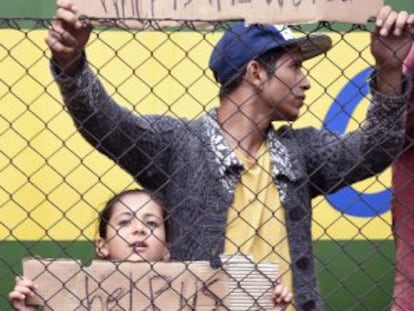Spanish society acts to take in refugees
While Madrid wrangles over EU quotas, local and regional officials announce plans to help


Faced with the greatest refugee crisis to hit Europe since World War II, Spain¡¯s local and regional administrations are stepping in to fill the shoes of a hesitant central government.
Municipal and regional authorities across the country are offering to help asylum seekers from countries such as Syria and Iraq, while the government of Mariano Rajoy wrangles with Brussels over how many refugees Spain is going to accept.
We have 110 social mediators who can help with the asylum claims of fleeing people, 40 percent of whom are children¡±
M¨®nica Oltra, Valencian deputy premier
Besides the tug-of-war with European officials over quotas, the Spanish migrant reception system is not prepared to deal with a large and sudden influx of people after years of budget cuts. A steady rise in asylum claims in recent years has not been matched by an increase in resources.
The government alleges that resources are already being allocated to the thousands of undocumented immigrants who cross into Spain from North Africa each year.
But the image of Aylan, a three-year-old Syrian child who drowned along with his brother and mother while trying to reach Europe, has shaken Spanish society into action. Unlike Germany, Spain has no record of xenophobic attacks against refugees, and a recent state-sponsored survey shows that 77.8 percent of Spaniards support taking in asylum seekers.
So far this year, Spain has received 6,202 asylum claims, according to the Interior Ministry. This is more than for all of 2014, and twice as many as 2012. But the figure pales compared to Germany, which is expecting 800,000 applications this year.
A proposal made by Barcelona mayor Ada Colau to create a network of refugee-friendly cities has met with support from other major Spanish cities. Madrid, Oviedo, A Coru?a, M¨¢laga and Alicante have confirmed their desire to participate, and regional governments are seeking a way to join the drive as well.
The city of Madrid, run by the leftist former judge Manuela Carmena, has earmarked €10 million to fund an integral support plan for refugees, who would be offered housing as well as help with education, psychological and bureaucratic issues.
Meanwhile, the deputy premier of the Valencia region, M¨°nica Oltra, on Wednesday told EL PA?S that Valencia will use public facilities as refugee reception centers.
¡°This is a dramatic situation that has to be addressed with resources,¡± said Oltra, of the Comprom¨ªs group. ¡°We have 110 social mediators who can help with the asylum claims of fleeing people, 40 percent of whom are children.¡±
The Valencia government wants banks to consider letting refugees stay in repossessed apartments standing empty
The Valencia government has also talked with the Red Cross and the Spanish Committee for Refugee Aid (CEAR) with a view to asking banks to consider letting refugees stay in some of the numerous repossessed apartments currently standing empty.
Meanwhile, the Catalan government is willing to take its share of refugees, but is asking the central authorities to accept the figure proposed by the European Commission as soon as possible. Catalan government sources said they have 28 beds that refugees could use for six months.
Madrid¡¯s regional premier, Cristina Cifuentes of the Popular Party (PP), said she will join the initiative but underscored that it is up to the central government and the EU to make decisions, not cities or regions.
Officials in Galicia and Navarre said they were in a position to take in 300 refugees each.
Additional reporting by Mar¨ªa Josep Serra, Mikel Ormazabal, Sonia Vizoso, Silvia Rodr¨ªguez, Luc¨ªa Boh¨®rquez, Concha Montserrat, Camilo S. Baquero, Ra¨²l Lim¨®n, Virginia Mart¨ªnez and Sergio Lillo.
English version by Susana Urra.
Tu suscripci¨®n se est¨¢ usando en otro dispositivo
?Quieres a?adir otro usuario a tu suscripci¨®n?
Si contin¨²as leyendo en este dispositivo, no se podr¨¢ leer en el otro.
FlechaTu suscripci¨®n se est¨¢ usando en otro dispositivo y solo puedes acceder a EL PA?S desde un dispositivo a la vez.
Si quieres compartir tu cuenta, cambia tu suscripci¨®n a la modalidad Premium, as¨ª podr¨¢s a?adir otro usuario. Cada uno acceder¨¢ con su propia cuenta de email, lo que os permitir¨¢ personalizar vuestra experiencia en EL PA?S.
?Tienes una suscripci¨®n de empresa? Accede aqu¨ª para contratar m¨¢s cuentas.
En el caso de no saber qui¨¦n est¨¢ usando tu cuenta, te recomendamos cambiar tu contrase?a aqu¨ª.
Si decides continuar compartiendo tu cuenta, este mensaje se mostrar¨¢ en tu dispositivo y en el de la otra persona que est¨¢ usando tu cuenta de forma indefinida, afectando a tu experiencia de lectura. Puedes consultar aqu¨ª los t¨¦rminos y condiciones de la suscripci¨®n digital.









































